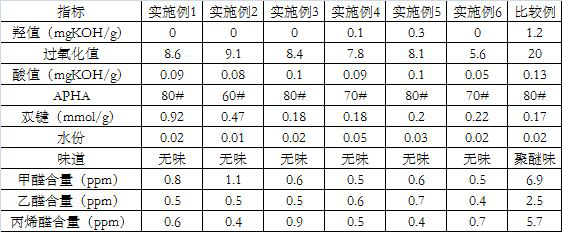Preparation method of acetyl-terminated allyl alcohol polyether
A technology of allyl alcohol polyether and terminal allyl alcohol, which is applied in the field of preparation of acetyl-terminated allyl alcohol polyether, and can solve the problems of high molecular weight, low peroxide value and low peroxidation Value and other issues
- Summary
- Abstract
- Description
- Claims
- Application Information
AI Technical Summary
Problems solved by technology
Method used
Image
Examples
Embodiment 1
[0024] A preparation method of acetyl-terminated allyl alcohol polyether, comprising the steps of:
[0025] (1) Add 1000g of allyl alcohol polyether with a molecular weight of 1000 and 122.5g of acetic anhydride to a 2L reactor at room temperature. After nitrogen replacement, turn on the stirring function of the reactor and raise the temperature to 125°C. Stir at temperature for 4 hours. The allyl alcohol polyether in this step uses allyl alcohol as an initiator, is formed by ring-opening polymerization with epoxide under the catalysis of potassium methylate, and is a finished polyether refined through a post-treatment process. Wherein the epoxide is butylene oxide.
[0026] (2) Raise the temperature of the mixture in the reactor to 135°C, and then carry out vacuum nitrogen degassing treatment in the reactor. The treatment time is 4 hours, and the vacuum degree in the reactor is less than -0.09 MPa.
[0027] (3) Stop nitrogen filling and degassing, lower the temperature of t...
Embodiment 2
[0032] A preparation method of acetyl-terminated allyl alcohol polyether, comprising the steps of:
[0033] (1) Add 1000g of allyl alcohol polyether with a molecular weight of 2000 and 66.5g of acetic anhydride to a 2L reactor at room temperature. After nitrogen replacement, turn on the stirring function of the reactor and raise the temperature to 130°C. Stir at temperature for 3.5 hours. The allyl alcohol polyether in this step uses allyl alcohol as an initiator, and is formed by ring-opening polymerization with epoxide under the catalysis of potassium hydroxide, and is a finished polyether refined through a post-treatment process. Wherein the epoxide is a random copolymer of ethylene oxide and propylene oxide, wherein ethylene oxide accounts for 20% of the total molecular weight of the copolymer.
[0034] (2) Raise the temperature of the mixture in the reactor to 140°C, and then carry out vacuum nitrogen degassing treatment in the reactor. The treatment time is 4 hours, and...
Embodiment 3
[0040] A preparation method of acetyl-terminated allyl alcohol polyether, comprising the steps of:
[0041] (1) Add 1000g of allyl alcohol polyether with a molecular weight of 5000 and 26g of acetic anhydride to a 2L reactor at room temperature. After nitrogen replacement, turn on the stirring function of the reactor and raise the temperature to 125°C. Stirring was continued for 4 hours. The allyl alcohol polyether in this step uses allyl alcohol as the starting agent, under the catalysis of potassium methylate and potassium hydroxide, it is formed by ring-opening polymerization with epoxide and refined through the post-treatment process. . Wherein the epoxide is propylene oxide.
[0042] (2) Raise the temperature of the mixture in the reactor to 145°C, and then carry out vacuum nitrogen degassing treatment in the reactor. The treatment time is 5 hours, and the vacuum degree in the reactor is less than -0.09 MPa.
[0043] (3) Stop nitrogen filling and degassing, lower the t...
PUM
 Login to View More
Login to View More Abstract
Description
Claims
Application Information
 Login to View More
Login to View More - R&D
- Intellectual Property
- Life Sciences
- Materials
- Tech Scout
- Unparalleled Data Quality
- Higher Quality Content
- 60% Fewer Hallucinations
Browse by: Latest US Patents, China's latest patents, Technical Efficacy Thesaurus, Application Domain, Technology Topic, Popular Technical Reports.
© 2025 PatSnap. All rights reserved.Legal|Privacy policy|Modern Slavery Act Transparency Statement|Sitemap|About US| Contact US: help@patsnap.com

